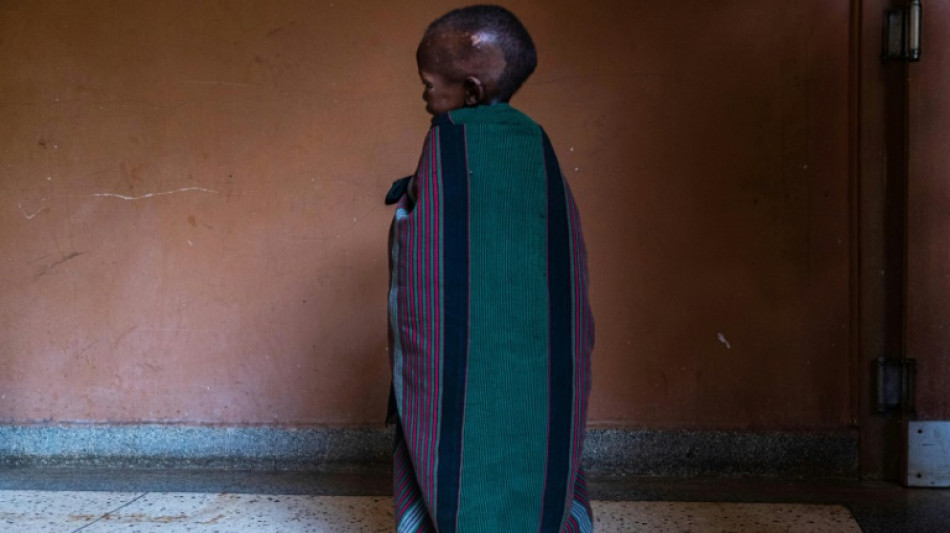
-
 Navalny lawyers face long sentences in Russian 'extremism' trial
Navalny lawyers face long sentences in Russian 'extremism' trial
-
Neuer returns but Musiala out for Bayern

-
 'Real-world harm' if Meta ends fact-checks, global network warns
'Real-world harm' if Meta ends fact-checks, global network warns
-
Auger-Aliassime belatedly beats Paul to reach Adelaide final

-
 Stock markets drift lower as US jobs data looms
Stock markets drift lower as US jobs data looms
-
Lancet study estimates Gaza death toll 40% higher than recorded
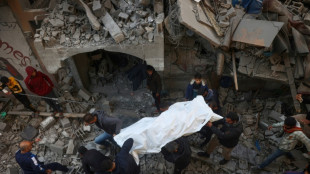
-
 South Korea's presidential security chief resigns
South Korea's presidential security chief resigns
-
Italian FM tours landmark mosque in first Syria visit

-
 'Apocalyptic': ghastly remains of Malibu come into focus
'Apocalyptic': ghastly remains of Malibu come into focus
-
Pakistan flight departs for Paris after EU ban lifted

-
 Nicolas Maduro: Venezuela's iron-fisted 'worker president'
Nicolas Maduro: Venezuela's iron-fisted 'worker president'
-
Ukraine's French-trained brigade rocked by scandal

-
 Venezuela's Maduro to take presidential oath despite domestic, global outcry
Venezuela's Maduro to take presidential oath despite domestic, global outcry
-
Red-hot Gauff vows to keep cool in Australian Open title charge

-
 Zverev says he has mindset to finally win Grand Slam in Melbourne
Zverev says he has mindset to finally win Grand Slam in Melbourne
-
Anti-war Russian theatre in Latvia fights language ban

-
 Nobel laureate Malala Yousafzai to visit native Pakistan for girls' summit
Nobel laureate Malala Yousafzai to visit native Pakistan for girls' summit
-
Shotgun watch: LA fire evacuees guard against looters

-
 Los Angeles fire deaths at 10 as National Guard called in
Los Angeles fire deaths at 10 as National Guard called in
-
'Control freak' Swiatek describes shock and 'chaos' over doping ban

-
 Vietnam jails ex-lawyer over Facebook posts
Vietnam jails ex-lawyer over Facebook posts
-
Sinner in dark over verdict as ATP says doping case 'run by the book'

-
 US President-elect Trump to be sentenced for hush money conviction
US President-elect Trump to be sentenced for hush money conviction
-
AI comes down from the cloud as chips get smarter

-
 Englishman Hall grabs share of Sony Open lead
Englishman Hall grabs share of Sony Open lead
-
Olympic champ Zheng says 'getting closer' to top-ranked Sabalenka

-
 Tajikistan bets on giant dam to solve electricity crisis
Tajikistan bets on giant dam to solve electricity crisis
-
Air tankers fight Los Angeles fires from frantic skies

-
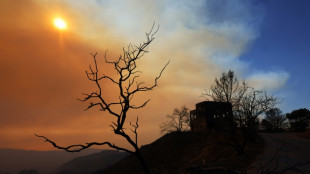 Right-wing disinformation targets DEI, 'liberal' policies as LA burns
Right-wing disinformation targets DEI, 'liberal' policies as LA burns
-
Osaka to play Australian Open after 'devastating' injury pullout

-
 'Disruptor' Medvedev ready to bring down Sinner and Alcaraz
'Disruptor' Medvedev ready to bring down Sinner and Alcaraz
-
Atletico can seize La Liga lead as Osasuna visit

-
 Navalny lawyers face long sentences in 'extremism' trial
Navalny lawyers face long sentences in 'extremism' trial
-
Sinner declares innocence as ATP chief says doping case 'run by the book'

-
 India's Kumbh Mela, world's largest religious gathering
India's Kumbh Mela, world's largest religious gathering
-
India readies for mammoth Hindu festival of 400 million pilgrims

-
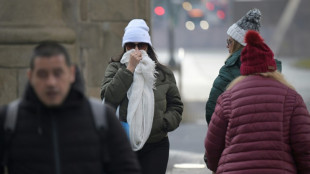 Uruguay bucks 2024 global warming trend
Uruguay bucks 2024 global warming trend
-
Last 2 years crossed 1.5C global warming limit: EU monitor
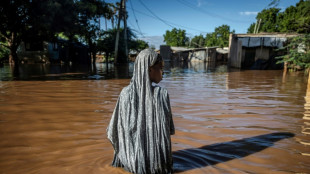
-
 Asian markets drift lower as US jobs data looms
Asian markets drift lower as US jobs data looms
-
Sabalenka has 'target on her back' in pursuit of Australian Open 'history'

-
 Croatia's populist president tipped for re-election
Croatia's populist president tipped for re-election
-
Veteran Monfils powers past teenager to reach 35th final

-
 Los Angeles fires rage on as National Guard called in
Los Angeles fires rage on as National Guard called in
-
Japan 'poop master' gives back to nature
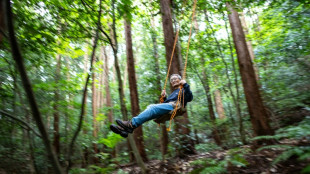
-
 UN watchdog says Australia violated asylum seekers' rights
UN watchdog says Australia violated asylum seekers' rights
-
Murray braced for Djokovic ire in coaching debut at Australian Open

-
 At CES, AI-powered garbage trucks reduce battery fire risk
At CES, AI-powered garbage trucks reduce battery fire risk
-
S. Korea presidential security chief urges 'no bloodshed' in Yoon arrest

-
 Combustible Kyrgios says tennis 'a bit mundane' without him
Combustible Kyrgios says tennis 'a bit mundane' without him
-
US Supreme Court to hear TikTok ban case


Hunger claims children in forgotten corner of Uganda
In one of Uganda's poorest and most lawless regions, anxious mothers clutch bone-thin infants in a malnutrition ward, terrified their child could be next to succumb to starvation in Karamoja.
One of Maria Logiel's youngsters, too weak to sit up, bears telltale skin lesions caused by extreme hunger. The other, strapped to her back, stares gauntly from sunken eyes.
"I came with these two because they were badly off, and going to die," Logiel told AFP at a hospital in Karamoja, a vast and isolated northeastern border region afflicted by drought, disease and armed bands.
"(But) I left two others home, and I worry that by the time I get back, they'll be no more," the 30-year-old mother said.
More than half a million people are going hungry in Karamoja, some 40 percent of the population of this neglected, long-suffering rural region between South Sudan and Kenya.
Natural disasters, plagues of locusts and army worms, and raids by heavily-armed cattle thieves have left little to eat.
As food has become ever more scarce, Karamoja's most vulnerable residents are struggling to survive.
"In three months we have lost more than 25 children under five due to the malnutrition," said Doctor Sharif Nalibe, the district health officer in Kaabong, one of Karamoja's worst-hit districts.
"And these were the ones under our care, but (who) were brought at the last minute to the hospital. But there are many who die and (are) not reported in the communities."
- Out of sight -
Starvation in Karamoja is going largely unnoticed as higher-profile crises, including looming famine in the Horn of Africa, and the war in Ukraine, compel global attention.
Even in Uganda, the desperation is out of sight, unfolding 500 kilometres (310 miles) from the capital Kampala in a part of the country long written off as harsh and volatile.
But the level of hardship is extraordinary, even by the extremes sometimes endured in Karamoja.
Across the region, about 91,600 children and 9,500 pregnant or breastfeeding women are suffering from acute malnutrition and need treatment, according to the latest assessment by humanitarian agencies and foreign donors.
"In terms of acute malnutrition... this year we have experienced the worst that we have had in the last 10 years," said Alex Mokori, a nutrition specialist from UNICEF, which is screening for malnutrition in Karamoja with local authorities.
Logiel said she resorted to foraging to put food on the table, but the wild plants often made her children sicker.
In desperation, she would sometimes purchase the mealy dregs from a popular locally-made sorghum brew called "malwa", even if the effect was mildly alcoholic.
Half a litre of this residue goes for about 40 US cents -- often more than she could afford.
"Often we failed to raise money and the children sleep hungry," Logiel said.
- 'Worse to come' -
With a porous border and thriving illicit trade, Karamoja has endured decades of tit-for-tat armed cattle raids between nomadic clans that wander the lawless frontier between Uganda, South Sudan and Kenya.
These incursions make life even more miserable for Karimojong communities entirely reliant on livestock and crops to survive, and government interventions to disarm rustlers have not stopped the cycles of violence.
The erratic effects of a changing climate -- Karamoja is experiencing harsh drought, but last year witnessed damaging floods and landslides -- have only multiplied the hardships bearing down on the region.
"Now, with the prolonged drought, and cattle rustlers, and communities left with no source of livelihood, we are heading for the worst," said Nalibe, the Kaabong district health officer.
For some, the worst has already arrived.
Nangole Lopwon went to sell firewood in a nearby village and left her hungry twins with one of her older children, only to return and find one of the young ones had died.
"What could I do? The child was not sick. It was purely hunger that killed him," said the mother of five from Kaabong.
Now she, too, is malnourished, and the surviving twin in a dire state.
"Even this one is about to die," she wailed.
L.Miller--AMWN